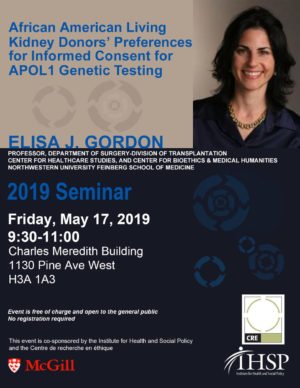
Elisa Gordon (Feinberg School of Medicine, Northwestern University)
Ajouter au calendrier
Quand :
17 mai 2019 Jour entier
2019-05-17T00:00:00-04:00
2019-05-18T00:00:00-04:00
Où :
IHSP Conference Room, Charles Meredith House; and CHUM
(9:30 am): 1130 Pine Ave West
Montreal QC H3A 1A3; (12:00 pm) 900 Saint-Denis Street, Tour Viger, 2nd Floor - Local R02.606, Montreal, QC
H2X 0A9
(9:30 am): 1130 Pine Ave West
Montreal QC H3A 1A3; (12:00 pm) 900 Saint-Denis Street, Tour Viger, 2nd Floor - Local R02.606, Montreal, QC
H2X 0A9
We are pleased to invite you to two talks by Elisa Gordon, Professor of Surgery (Organ Transplantation) at Northwestern University, on Friday, May 17, 2019. Dr Gordon is visiting the CHUM and has kindly agreed to give a talk at McGill during her visit as well.
Dr Gordon’s talk at McGill is part of the seminar series of the Centre de recherche en éthique Ethics & health axis series, on this occasion hosted by the Institute for Health and Social Policy at McGill. Dr Gordon’s second talk will be held at the CHUM later on the same day. Please see below for details on both talks.
Two presentations:
1. 9:30-11:00 am: IHSP Conference Room, Charles Meredith House – 1130 Pine Ave West, Montreal QC H3A 1A3
Title: African American Living Kidney Donors’ Preferences for Informed Consent for APOL1 Genetic Testing
Abstract: This presentation will briefly review racial/ethnic disparities in living kidney donation as background for examining the ethical dilemma of whether or not APOL1 genetic testing should be incorporated into routine donor evaluation. Patient-centered data on living donors’ attitudes about, and preferences for informed consent for APOL1 genetic testing will be presented to guide the ethical analysis.

Jointly hosted by the IHSP and the Centre de recherche en éthique (CRÉ).
2. 12:00-1:00 pm: CHUM -900 Saint-Denis Street, Tour Viger, 2nd Floor – Local R02.606, Montreal, QC, H2X 0A9
Title: Improving Healthcare Equity: Lessons Learned from Implementing Culturally Competent Transplant Care
Abstract: This presentation will briefly review disparities in living kidney donation rates among Hispanics, and describe a U.S. culturally competent and linguistically congruent Hispanic kidney transplant program designed to reduce such disparities. The talk will focus on the barriers and facilitators to the implementation of this program at two other U.S. transplant centers to highlight factors that hospitals should consider when aiming to improve equity as part of quality care.



